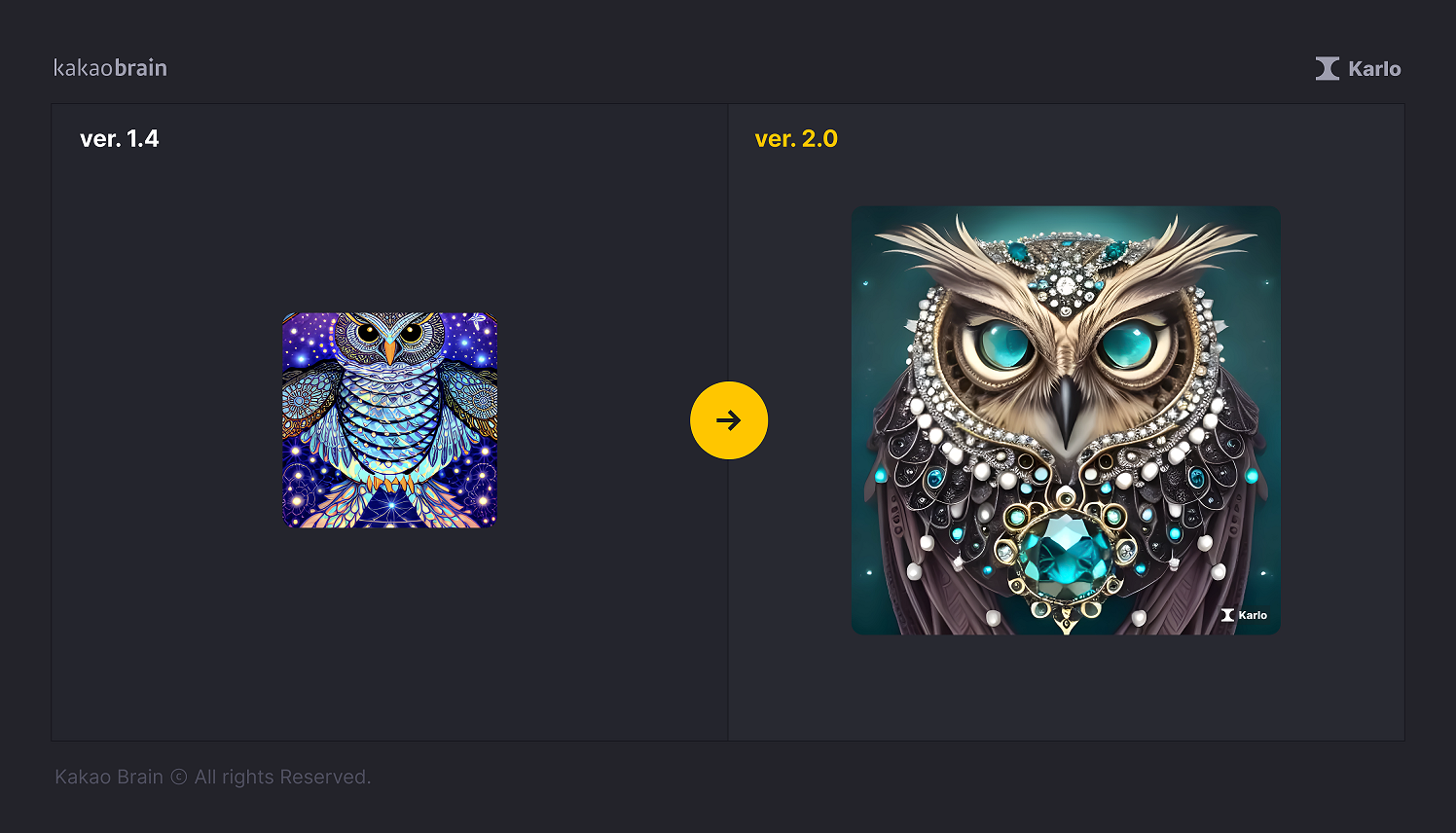South Korean tech giant Kakao wants a piece of the action in the generative AI race, and today it made a bid for it, with big updates to its AI image generator Karlo and its KoGPT large language model, as well as a new fund to back AI image generating startups.
Kakao’s AI division Kakao Brain‘s launch of Karlo 2.0 — an AI-powered tool that can produce images from text prompts — enables users to generate an image in just a matter of seconds by inputting prompts in English or Korean.
KoGPT 2.0, meanwhile, isn’t due to be released until Q3 2023, but it will be trained on 30 billion different parameters.
Kakao Brain also has set up Karlo 100X, a 10 billion won ($ 7.7 million) fund, to back AI startups that develop image generation technology.
Kakao’s releases underscore the pressure that the company, like all incumbent tech players, has been facing to keep up with the pace of AI progress: newcomers like OpenAI, Midjourney and more have been making a huge splash and controlling the narrative on the biggest innovations of the moment. For older companies, the threat is always not just that they won’t capitalize on whatever is coming next, but they’ll start to look old and stale.
Tellingly Karlo 2.0 is coming just seven months after the company’s previous update (1.4). Kakao Brain previously released an advanced text-to-image generator RQ-Transformer and minDALL-E on GitHub.
The company says Karlo 2.0 is trained on 300 million texts and images and supports a maximum resolution of 2048×2048, resulting in better quality and clarity of images in various styles and sizes. This is a big advance on earlier editions of Karlo: The previous version was trained on 180 million text and image data points.
Karlo 2.0 will also be more developer-friendly, with a publicly-available API for Kakao developers that gives them access to creating 600,000 images per month for free.
Its predecessor, also called KoGPT, was originally rolled out in 2021 and trained on 200 billion tokens on just 6 billion parameters, using Korean data. The plan is now to add English, Japanese and other Asian languages, including Bahasa Malaysia and Vietnamese. Kakao Brain is slated to launch KoGPT 2.0 with 30 billion parameters, targeting the third quarter of 2023.

Kakao’s moves are interesting, but they are not coming in a vacuum and will face a lot of established competition. Image generators are already available from OpenAI (in the form of DALL-E), Midjourney and Stable Diffusion‘s Dream Studio. Just last week, Chinese tech behemoth Alibaba unveiled a generative AI-powered text-to-image model Tongyi Wanxiang for enterprise customers.
As with the company’s regionally leading messaging app KakaoTalk, the opening for a company like Kakao seems to be a leading player in AI images in its market, rather than aiming for world domination. Earlier this year, Eun-Taek Hong, chief executive officer of Kakao, said in its earnings call that the Korean tech company would offer generative AI services. But rather than competing against global peers in the field, Kakao would develop AI offerings with a focus on the Korean language (for now), Hong said.
It will be interesting also to see how and if Kakao builds this out in tandem with its other ambitions in AI. For example, it’s making a foray into the healthcare industry. The company is developing an AI-generative offering to analyze a medical image and write a first-draft diagnosis of a patient’s chest X-ray for doctors. It is also developing AI technology for drug discovery.
“We are pleased to introduce Karlo 2.0 through a process of learning various image data and technological advancement, including human proportions and composition, and perspective views that express a sense of space and three-dimensionality,” CEO of Kakao Brain Kim Ildoo said in a statement. “We will use a wealth of data and user feedback to create photorealistic images while also developing an image generation model that can cater to a wider range of user needs.”
Even regionally, there is plenty of competition for Kakao, with other South Korean companies aggressively developing their own AI products to jostle for a position in the generative AI space.
Naver is set to launch a generative AI service called HyperCLOVA X and an AI chatbot SearchGPT next month.
In December 2021, LG AI Research, an AI think tank unit of Korean tech firm LG, unveiled its AI-powered large language model called Exaone with capabilities of 300 billion parameters. Most of LG’s subsidiaries, including LG Electronics, LG Energy Solution, LG U+ and LG Display, use Exaone. LG Electronics released its own AI Chatbot in May in the wake of blocking the use of generative AI tools like ChatGPT, Google Bard and Microsoft’s Bing AI.
And Samsung is reportedly developing a private generative AI tool for internal use only after restricting generative AI tools after sensitive data leakage.
SK Telecom, one of South Korea’s biggest telco companies, also added Chat GPT technology based on Microsoft’s Azure OpenAI to its AI chatbot called A. [A dot]. Two of Korea’s biggest telco companies, KT and LG’s U+, are developing AI chatbots based on ChatGPT technology, per local media outlets.
This story has been updated to reflect that KoGPT 2.0 will not be based on OpenAI’s GPT-3.5.































Comment